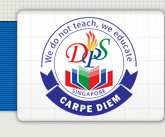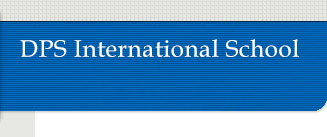| Grade 3 to 5
Years spent in primary school have been recognized as the most crucial phase in the development of a child. Long-term academic success and achievement results from factors in the primary setting. We at DPS International, therefore strive to ensure an environment that lends itself to student achievement providing optimal conditions for student development.
The curriculum for Classes 3 to 5 is based on the ICSE guidelines, which allows enough room to address individual needs and to create a learner-centred classroom – one of the strengths of the ICSE curriculum – while introducing skills, concepts and information which will lay a strong foundation for the secondary level.
The academic year is divided into two semesters with exams at the end of each. Teachers can, however, monitor a student’s development throughout the academic year by assessing projects, worksheets, and various class work and homework assignments. This emphasis on internal assessment continues in the secondary stage.
At the primary level there is a notable increase in the demand for higher levels of verbal reasoning and written communication skills. In the language classroom care is taken to ensure that students recognize speaking, listening, reading and writing as active, constructive processes. They are encouraged to summarize ideas and state their own views. They also learn to consciously attend to the rules of the written language to ensure that sentences are complete, interesting and connected to each other.
Literature is taught with the aid of a prescribed book and a reader. The text is examined with care and precision and students develop the ability to comprehend semantic and syntactic cues, in other words, they are able to attach meaning to words and identify the structures and basic language patterns used in English.
The curriculum is tailored to meet the needs of learners who have had different levels of contact with and proficiency in English. Classrooms are, therefore ‘hospitable’ to children from a diversity of language backgrounds. English is used and taught across the curriculum and all students soon acquire the necessary level of proficiency.
The mathematics curriculum aims to establish a strong foundation of mathematics in the primary grades. There is an emphasis on practice to reinforce knowledge of math-facts, which are the building blocks for solving more complicated problems. Lessons are based on concrete facts and examples with an increased emphasis on conceptual understanding to enable students to gradually progress from concrete facts to the underlying abstract ideas, or the ‘logic stage’ to support the larger mathematical curriculum goals.
Primary Science classes too aim to strike a balance between teaching factual knowledge and developing the spirit of scientific inquiry. Science lessons are planned to stimulate the pupils’ curiosity in the world around them, building on existing knowledge, interests and ideas, and linked to everyday contexts.
Social Studies is an integrated area of inquiry drawing on the disciplines of history, geography and sociology. Lessons help students to develop their personal, familial, ethnic and cultural identities as they learn about people in relation to their past, their environment and their society. Learners are prepared for the in-depth study of history and geography as separate curriculum subjects from class 6 onwards.
At DPS International we believe in total education and appreciate that much of tertiary learning takes place outside the traditional classroom. Students are encouraged to participate in a wide range of athletic and cultural activities. They attend classes on Music, Dance, Physical Education, Art & Design, Speech and Drama, to not only acquire specific skills but also develop their latent potentials and extend their breadth of interest.
There are weekly Co-curricular activity (CCA) classes and students are welcome to choose any activity from different clubs. Our school has also made provisions for additional training in soccer and cricket for boys and basketball for girls.
Every student is also assigned to be a member of a House and can participate in extra curricular activities with the four Houses as basic units in competitive activities. This gives them an opportunity to interact with different age groups and also helps to develop their organizational and leadership qualities. Participation in the ECAs helps to instill discipline and nurtures a cooperative attitude, sensitivity to others and the ability to work in a team for achieving common goals.
The Primary curriculum is designed to enable learners to step over the threshold of secondary school with confidence and eagerness.
| 
